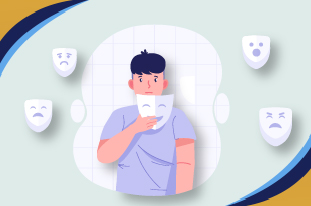You are trying to remember your past? But instead of a clear picture, you get a rush of doubts and a knot of anxiety.
Did I really do that?
Did I forget to check something important?
Am I a bad person because of an action I can’t quite recall?
What if someone with OCD has memories that feel wrong? Psychiatric experts call this false memory OCD.
The problem is not the bad memory itself. Rather, the powerful feelings of guilt, fear, and doubt control your everyday thoughts and actions.
However, like other OCD types and mental health disorders, this false memory OCD is also treatable with the right medication and therapy.
What is obsessive-compulsive disorder (OCD)?
Before we discuss false memory OCD, it is helpful first to define OCD.
OCD is a mental health condition with two main parts:
Obsessions
These are thoughts, images, and feelings that keep coming back even when you don’t want them. They cause a lot of worry and distress. They interrupt your normal thinking and feel impossible to ignore.
Compulsions
These are rigid, repetitive behaviors or mental acts you feel forced to perform. You do them to try and neutralize the intense negative feeling from the obsession. The compulsion gives you temporary relief, but it locks you into the OCD cycle.
Get to Know More About: Which Brain Region Is Believed to Play a Critical Role in OCD?
Obsessions can be of many things, like fear of germs, intense worry about harming others, or an intense need for things to be “just right”. When these themes focus mainly on distorted or inaccurate memories, experts call it false memory OCD.
Common symptoms of OCD are:
- Contamination (germs or dirt)
- Harm (constant worry about worrying yourself or others)
- Sexual content
- Religious or moral beliefs
- Symmetry and order (needing things to be perfectly aligned and in systematic order)
What Does False Memory OCD Mean?
False memory is a way OCD shows itself, a specific condition. It involves primary obsessions related to the accuracy of your memories from past events.
While the official diagnostic manual (DSM-5-TR) lists only one diagnosis for OCD, doctors and therapists use subtypes like this one to better understand and talk about a patient’s main problems.
This type of OCD doesn’t focus on a simple memory lapse. Instead, it creates intense anxiety by attacking your deepest sense of self. It makes you worry over whether you are a “bad person” and feel extreme guilt over imagined or exaggerated past events.

According to psychologist Dr. Jenna Feldman, people with false memory OCD have repeated, upsetting thoughts where they constantly ask themselves, “Did my past really happen that way?” This can be about events from long ago, or something that just happened in the morning.
Why Does Your False Memory Feel Wrong?
The problem is that the more you try to think about and check past events, the more confusing your memory becomes. Your intense anxiety and the act of replaying the event over and over again can skew the original connection, making it feel less certain.
False memories in OCD are not necessarily intentional lies. They can be:
- Inaccurate recollections: You remember the event, but the details are distorted and changed by your fear.
- Completely made up: It is also possible that your brain totally fabricates the memories. The obsessive thoughts are about events that never happened at all, but the doubts make it feel real.
The key is the intense feeling of doubt, guilt, and uncertainty that comes with the thought.
Read More: Understanding OCD Groinal Response: Unraveling the Misunderstood Symptoms
Symptoms Of False Memory OCD
Since false memory OCD is a type of OCD. It has the two core symptoms, obsessions and compulsions. These two false memory OCD symptoms are specific to the memory.
1- The Obsessions (The Doubts)
These are the constant, intrusive thoughts that start the cycle. They are repetitive and cause great anxiety about something you might have done or failed to do in the past.
Examples of these distressing, doubtful thoughts include:
- Did I cheat on my partner years ago and completely block it out?
- When my child fell, was it because I intentionally pushed them even though I remember helping them up?”
- Did I say something inappropriate to my boss in the meeting, and now I am forgetting it?
- Did I leave the stone on in the kitchen when I moved out of the apartment?
It is important to know that simple worry about the past is a common thing. Everyone wonders if they said the right thing or made a mistake. The difference with OCD is that these thoughts are uncontrollable, persistent, and cause severe distress for a significant amount of time each day. They do not go away on their own.
2- The Compulsions (The Checks)
You perform these actions, either mental or physical, to try to relieve the anxiety and restore your confidence in your memory. These are the things that keep you trapped.
In OCD false memories, compulsions often involve:
Mental reviewing
You recall the past event repeatedly in your mind, like watching a video on loop, searching for proof of what really happened. This never helps and only makes the memory feel more confusing.
Seeking Reassurance
You ask friends, family, or partners to confirm the details of the event or to tell you that you are a good person.
Confessing
You feel the need to confess to perceived mistakes or wrongdoings, even if you are not sure they happened.
Revisiting scenarios
You physically go back to a place to try and recreate the scene to check if your memory is right.

Self assurance
You repeat statements in your head, such as “I am a moral person” or “I would never do that,” trying to deny the fear mentally.
Learn More About: OCD in relationships: Understanding, coping, and supporting each other
What Causes False Memory OCD?
Experts do not know the exact cause of OCD. It might be the result of a complex combination of factors, like:
- Genetics: OCD often runs in a family.
- Brain structure: Certain brain areas and chemical messengers (neurotransmitters) can cause OCD, false memory, or denial.
- Environmental and experiences: stress, trauma, and life events can be the trigger cause of this disorder.
The reason is that false memory OCD targets specific concerns. These concerns could arise if you place great importance on being moral, hygienic, responsible, or kind. In those cases, your OCD is more likely to focus on those areas. It often connects to core values.
As Dr. Feldman says, people with false memories of OCD often have a challenging time handling uncertainty.
How To Treat False Memory OCD?
Effective treatment for false memory OCD is the same effective treatment that is used for all other subtypes of OCD.
It could be a comprehensive approach that includes both psychotherapy and medication management.
1- Exposure and Response Prevention (ERP)
This is like the gold standard of psychotherapy for OCD. ERP is a specific type of cognitive behavioral therapy (CBT). It works by breaking the cycle of obsession and compulsion.
It is based on two steps:
- Exposure: You face the thoughts, images, or situations that trigger your obsession. (writing down the worst possible false memory).
- Response prevention: You agree to resist the compulsion that follows. (resisting the urge to review the memory or ask your partner for reassurance mentally)
The goal is to teach your brain that the anxiety will finally drop on its own, even if you do not perform the compulsion. You learn to live with doubts and uncertainty, which helps to mitigate the possibility of obsession.
Read More: OCD & Guilt: Emotional Struggle Behind Obsession
2-Medication management
The treatment process through medication for OCD false memories is a critical part for many people with OCD.
A specific class of antidepressants is usually prescribed for false memory OCD treatment. These medications work by changing how the brain uses the chemical serotonin, which helps to reduce the frequency and intensity of the obsessive thoughts. However, it often takes up to 12 weeks to see visible improvement from medication. For most people, the best results come from a treatment plan that combines medication with ERP therapy.
Taking The Next Step Towards A Healthy Mind
False memory OCD can make you feel disconnected from your own history and leave you trapped in an endless loop of doubt and guilt. The more you check and re-check your memory, the more it will feel your anxiety.
At Orange Coast Psychiatry, we specialize in helping individuals break free from this painful cycle. We offer expert diagnosis, personalized medication plans, and evidence-based psychotherapy to help you regain control over your mind and your life.
We help you to avoid replaying the past.
Contact Orange Coast Psychiatry today to schedule a consultation and take the first step towards finding clarity and peace.
























